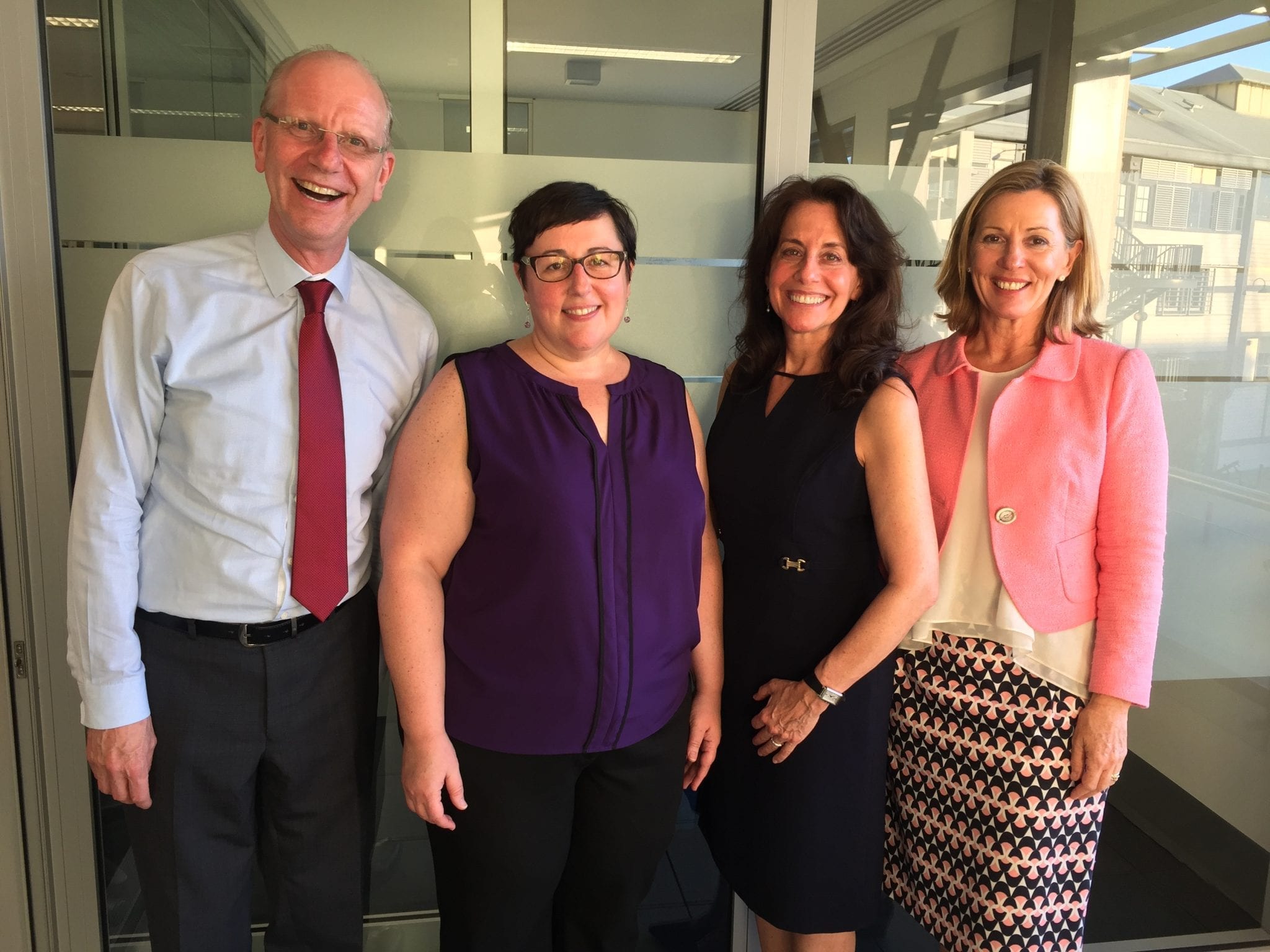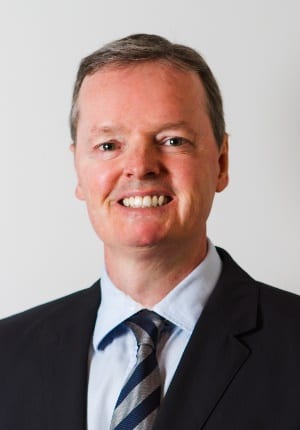No matter how far you go, leadership challenges stay the same ….. but why?
The Art of Leadership Newsletter
Stephenson Mansell Group (SMG) recently joined with Management Research Group (MRG) to host a presentation ‘Preparing for the Millennial Era: a Data-Driven Look at What Motivates the Next Generation of Leaders’ by Tricia Naddaff, President MRG. MRG is a global leader in the design and delivery of evidence-based, insightful diagnostic instruments, of which SMG utilise their Leadership Effectiveness Analysis (LEA).
During this presentation, Tricia shared some fascinating insights as a result of recent research undertaken by MRG into the behaviours, trends and motivators when looking at leaders across generations. These unique insights come as the result of more than 30 years in the leadership and research space.

Joe Fischer, Executive Director SMG; Staci Nisbett, Chief Sales and Solution Officer MRG; Tricia Naddaff, President MRG & Virginia Mansell, Chairman SMG
Some of the observed trends include:
When looking at leaders from different generations, but comparing them at the same age, we notice fewer differences in leadership impact and capability than when comparing different generations as a whole (eg. Gen Z vs Baby Boomers). We have to be cautious not to overstate generational differences since some of the dynamics can be explained by age rather than the generation born into.
Each generation has different and varied influences, based on what is going on around them, shaping their motivation for leadership roles, work ethic and desired workplaces. These motivators can be implemented to target new recruitment and leaders in your company. For example, trends show Millennials value companies which are socially and environmentally conscious and they seek jobs which mirror their values and encourage teamwork.
There is potential for generalisation by the Baby Boomer generation of the work ethic of Millennials and Gen Zs. Overcome this by adjusting perspectives to allow a clearer view of skill sets and leadership potential; best done by thinking “What was I like at that age” rather than thinking “just the youth of today”.
Regards,
Virginia Mansell
Chairman
No matter how far you go, leadership challenges stay the same ….. but why?

“If I want something done, I have to do it myself.” We hear that refrain too often from leaders, frustrated that their senior people can’t seem to get the job done.
Leadership is a cornerstone of a successful organisation, especially when it comes to the top executives. However, those executives often come to their roles ill-prepared for the tasks of leadership, to manage others and themselves. Something, somewhere, has been missing in their development and it is costing organisations.
We decided to take a look at our data collected over years of coaching assignments – SMG conducts more than 300 coaching assignments per year – to see if we could identify the gaps in executive and leadership development.
What we found surprised us.
The leadership issues that leaders are struggling with in the middle rungs of organisations are often the exact same issues that are being faced by CEO’s and their top teams. This tells us that these issues are systemic!
The problems to be solved
From our coaching report data, the following issues arose as consistent themes:
- An inability to lead one’s self and develop the emotional intelligence to be able to take different perspectives.
- An inability to influence others and foster relationships.
- Silos between and within teams.
- A lack of trust in teams, with people feeling they can’t speak openly.
- Lack of commitment and accountability.
- An inability to adapt leadership style to suit the other person in the conversation.
- Inconsistent motivation and/or inability to motivate others.
- High levels of stress and burn out and a lack of tools to combat these.
- An inability to constantly adapt, and lead others through change.
When we took this list to some of our clients, every single one of them agreed that these issues were relevant at all levels of their organisations. And this was universal across every industry and sector.
What surprised us was how little progress had been made throughout leadership careers. We had expected that, as people moved up their organisation, they would master certain leadership and management skills and the issues they faced at higher executive levels would have changed and grown in complexity.
Why the gap exists
The fact that this did not happen tells us two things, one of which is that people management is hard. People often say that the hardest part of their executive careers is those elements to do with people.
The second thing this research tells us is that there is a development and training gap right through that middle layer of organisations. A layer which we have identified as the most critical time for developing leaders.
People receive training and development when they are identified as ‘high potential’ and given their first team to lead, as first line managers. But that “Management 101” training does not equip them for the rest of their career. They sink or swim.
Those “middle rung” years are very busy. These people are expected to multitask, continuing to perform roles as technical specialists (as lawyers, accountants, or in sales, for example), while also taking on the demanding task of leading and managing others.
They often need help from their own managers or the human resources team.
If they get to senior levels of an organisation, they can arrive unprepared and – even when they are offered executive education – have missed out on the development of some foundational competencies.
As well as putting those people under personal and professional stress, this lack of development exposes organisations to weaknesses that can lead to underperformance, workplace dysfunction, low employee engagement and high staff turnover. The cost of these issues in financial and human terms is substantial.
Tackling the issues
Now the research has told us what the issues are, how should organisations go about tackling them? The solution is to provide training to those first-time leaders once they have been in their role for six to 12 months. They are excited about their new opportunity and they have had a taste of what it is actually like to be in a management / supervisory role, but haven’t picked up too many bad habits yet. This is a crucial time as their technical prowess cannot solve the people issues they are now facing.
The key is to address the gaps and provide a foundation at the start of their leadership career, rather than trying to plug the holes a few years later.
By doing this, organisations will create a critical mass of skilled people, an alumni group, at that middle level, to support each other and drive the organisation forward. A company may have one CEO and a handful of senior executives, but it could have a cohort of 40 to 50 empowered mid-level leaders who can create change and solve organisational problems.
Conventional wisdom says that role modelling needs to start at the top and cascade down. In a perfect world, this is certainly the way to go. But these days, how often is that really achievable? By starting in the middle and creating a cadre of effective managers who can lead their teams and who don’t need to rely on their often unprepared leaders to help them resolve their leadership issues, the organisation creates a ripple effect of high performance leaders role modelling down and at the same time, releasing their own leaders to deal with strategic organisational issues which is where they should be concentrating.
We have used the findings from our research to reconfigure and re-target our successful leadership program ‘The Focused Executive’ – based on Virginia Mansell’s book of the same name – and are rolling the program out both here and in Asia. This program is aimed at developing a strong middle layer of self-aware, adaptable and resilient organisational leaders through applied, practical learning built on adult development principles.
SMG has created a diagnostic tool to help identify the extent of these issues within organisations. To request a copy of the tool and a complimentary analysis of the results follow this link and use the subject heading ‘TFE diagnostic’ https://smgrp.com.au/contact/
Kind Regards,
Joe Fischer and Chris Goris

About the Author: Joe Fischer is an Equity Partner and Executive Director with SMG, an experienced international corporate executive, company director and executive coach. He has also run his own HR consultancy and held senior executive positions with Nestle and the P&O Group working in Australia, Switzerland, Asia, the UK and the Middle East.
 About the Author: Chris Goris is SMG’s Leadership and Programs Consultant. He has a background as a chemical engineer, working for BlueScope Steel and then, in business development for water treatment company Ovivo. He has also managed businesses and worked as a business and success coach.
About the Author: Chris Goris is SMG’s Leadership and Programs Consultant. He has a background as a chemical engineer, working for BlueScope Steel and then, in business development for water treatment company Ovivo. He has also managed businesses and worked as a business and success coach.
What’s On
 Perspectives on Leadership for Women Public Program
Perspectives on Leadership for Women Public Program
Designed to help female senior leaders to align who they are with how they lead, this program has a practical and hands-on approach and focuses on personal presence and communication; resilience; change and complexity; and finding your mentors and sponsors. To embed the key learnings from the program, and also to enable participants to explore specific challenges and opportunities, the two one-day workshops are supported by two individual coaching sessions with a member of our coaching team.
Registrations now open…
Sydney – Perspectives on Leadership for Women – 4 May & 1 June 2018
Sydney – Perspectives on Leadership for Women – 19 October & 16 November 2018
Brisbane – Perspectives on Leadership for Women – 26 October & 30 November
Perspectives on Leadership for Women coming to Melbourne Soon! – Send your Expression of Interest here
 Executive Presence and Impact Workshop
Executive Presence and Impact Workshop
The first of our Executive Presence and Impact Workshops with Peter Kingston was held in Sydney in February with a sold out session.
What the attendees said about workshop:
“Peter is very engaging and personable – He respectfully challenges and moves you out of your comfort zone”. “Peter Kingston’s attitude and facilitation was outstanding”. “Group feedback was brilliant”. “Detailing a principle and then providing examples and practice was helpful”.
Tickets for the Sydney, 19th June program are selling out fast… don’t miss out. Click here to register.
 New Stephenson Mansell Group Associates
New Stephenson Mansell Group Associates
SMG is excited to welcome three new mentors to join our experienced Associates team. Steve Hamer, Steve Mann and Emma Stein bring with them a variety of industry experience and expertise to the SMG mentoring capabilities.
We encourage you to discover more on each of these new mentors by viewing their profile:
Steve Mann – Emma Stein – Steve Hamer
What’s Trending in Leadership?
Continuing the discussion from our blog, research over the past 10 years has raised similar leadership gap issues from a range of different perspectives.
 The costs of poor leadership
The costs of poor leadership
The Ken Blanchard Companies White Paper “The High Cost of Doing Nothing: Quantifying the impact of leadership on the bottom line” suggests that most organisations are operating with a 5% to 10% productivity loss that better leadership practices could eliminate. What is this cost in dollars to your organisation?
Good leadership is the key to retaining good employees and developing strong future leaders. Outlined by Smart CEO are some guidelines around the positive impact that consistent, effective leadership behaviours can have on your organisation’s people, passion, performance and profits!
 The Leadership Gap
The Leadership Gap
Research suggests that there is a leadership gap, where crucial leadership skills in organisations are insufficient for meeting current and future needs. Highlighted by CCL are 5 steps that can be taken to help bridge this gap.
Research completed by Development Dimensions International, 2015 Global Leadership Forecast, found that only 40 per cent of the executives surveyed are happy with the quality of leadership in their organisations.
Welcome to our brand new ‘Meet our Team’ section of our newsletter
We are thrilled to be able to bring you insights each month into the experience and background of our coaches, mentors and facilitators, and how they can accelerate your leadership development.
 This month … meet Sean O’Toole.
This month … meet Sean O’Toole.
Tell me a little about the industries and/or areas you specialise in?
I have a background working in government and tertiary education but over the past three years have also worked with the corporate and non-government sectors extensively. I’d like to think I am open to working with anyone or any organisation. The more I am exposed to new people and new organisations, the more I realise how similar the challenges and goals are. The difference is usually the business values and purpose.
Tell me how you first became involved in the coaching/mentoring space?
SMG colleague Jon Isaacs coached me about 15 years ago and the experience had a very positive effect on me. At that time I was moving into senior management and the introduction of coaching in government was only starting, but through working with Jon I believed it would eventually be an important part of organisational and personal development. I became qualified as a coach myself and went on to set up extensive internal and external coaching programs wherever I worked.
What has surprised you most about working as a coach/mentor?
How vulnerable and uncertain some people who are in leadership positions can often be and conversely how little time they often spend on the human side of what they do. Being great at strategy or operations in an organisation doesn’t always correlate to knowing yourself or your team. Also, how helping someone make small adjustments to behaviour or thinking can have immediate and profound effects.
What would you tell someone who is thinking about starting a coaching or mentoring program?
It helps to be clear about what the coaching or mentoring might help you achieve (even if you are not clear about your goals) and be open to the process. If the reason is remedial or to deal with problem behaviour others have detected, then I think coaching or mentoring for remedial purposes has to be dealt with internally in the organisation first. I also think people need to choose their coach carefully. I think rapport building and trust is the foundation of the process.
What are some of your passions outside of the office?
I love art and have painted for years. I love reading biographies. I’m a bit sports mad and I love the outdoors.
What might someone be surprised to know about you?
I spent five years as a detective in the Australian Federal Police. That was steep learning curve but I like to think I learned a lot of valuable lessons about human behaviour that have stayed with me all these years.
Where will we find you on your days off?
Hopefully somewhere enjoying the outdoors and nature. I love hiking, fly-fishing, swimming and surfing. Can’t get enough of big open spaces.
My greatest inspiration is my parents and my family. I’m also inspired by people who have a had a rough upbringing and battle through to make a successful life for themselves. I’ve been fortunate to meet many people like this and am proud to call some of them my friends.
The greatest lesson I learned was it probably sounds like a terrible cliché but ‘smart people surround themselves with smart people’. A good friend who was a very successful car salesman told me that years ago when I first started work and it has stuck with me. He was a great salesman and an amateur philosopher. When I think about that, he could have been talking about mentors and coaches and his message was that no one really achieves much on their own.








